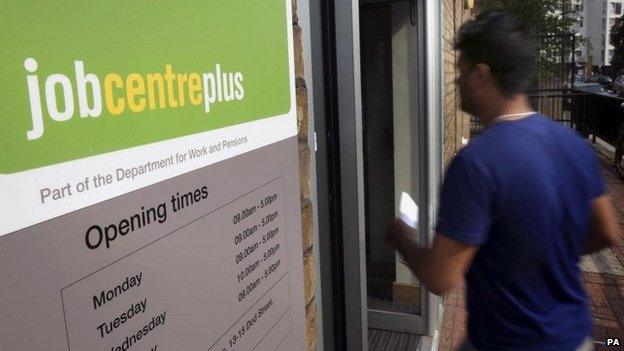Don't weep for old economic targets
- Published
Do you remember when the last figures for £M3 money supply came out? No, I didn't think so.
When I started reporting business news in the mid-1990s it was quite a big deal - it's a measure of the amount of money going round particular parts of the economy.
It is still measured by the Bank of England, but hardly anybody cares any more because we no longer target money supply.
So you probably shouldn't shed any tears at the news that the claimant count, which is a measure of the number of people claiming unemployment benefits, has lost its designation as a National Statistic.
The change was made because the introduction of universal credit is making it harder to count.
Wednesday's unemployment figures, external were the first to have an experimental measure that included universal credit.
The downgrading of the statistics did not stop Chancellor George Osborne quoting the figures widely.
Standing in for David Cameron at Prime Minister's Questions, he repeatedly quoted claimant count figures starting with those for Lewisham, which he mentioned in his first reply.

Designation of official statistics as National Statistics is supposed to show that: "the statistics meet the highest standards of trustworthiness, quality and public value".
The claimant count used to be the headline measure of unemployment in the UK, but there was some criticism of it as a measure, because it could be influenced by government decisions about who was entitled to claim unemployment benefit and whether they could be moved to other benefits such as incapacity benefits instead.
As a result, in 1998 the headline figure became the one based on the Labour Force Survey, which follows the guidelines of the International Labour Organisation.
The headline unemployment figure is generally higher than the claimant count because it includes some people who are looking for work but not eligible for benefits such as students looking for vacation work or people who are only looking for part-time work.
What about the Retail Prices Index? It used to be our headline measure of inflation, but it was replaced with the Consumer Prices Index and two years ago it was decided that it too was not good enough to carry the National Statistics designation.
We probably shouldn't get emotionally attached to different economic measures.
And there are good reasons for changing the way we measure things.
In the case of the claimant count, eventually, everybody who is unemployed and claiming benefits will be receiving universal credit. But calculations become more difficult, because not everybody claiming universal credit will be unemployed.
Also, some people are included in the new, experimental claimant count who receive universal credit but are not required to seek work, such as some disabled people, who would not previously have been part of the claimant count.
So we move on, and maybe in 20 years nobody will know what the CPI was, or why we used to follow it so closely.